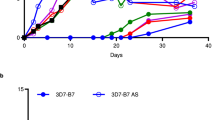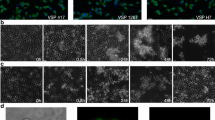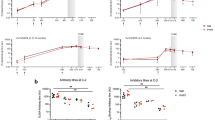Abstract
SUCCESSFUL cellular differentiation and function are dependent upon responsiveness to external stimuli, both useful and harmful, and this responsiveness is particularly evident among some parasitic protozoa. Their environment changes abruptly at transmission from invertebrate vector to mammalian host and becomes potentially harmful when the host mounts an immune response. Several, and possibly most, protozoan parasites avoid total destruction by the immune response they evoke by repeated changes of antigenicity1. Replacement of one population by another is detectable in tests carried out at weekly intervals2,3, and variation at this rate apparently continues for months and perhaps even years. In the absence of suitable techniques for in vitro cultivation, the question remained whether this variation resulted from immunoselection or from a form of antigenic modulation. Here I have attempted to clarify this point with one species of malaria parasite, Plasmodium knowlesi, using an in vivo technique based upon earlier observations4,5 that Macaca mulatta, sensitized with P. knowlesi antigen in incomplete Freund's adjuvant, produces high titres of variant-specific schizont-infected cell agglutinating antibodies which were not protective. Animals sensitized in this way were challenged with homologous parasites in numbers small enough to allow detection of possible immunoselection by delay in parasitaemia or failure in the appearance of a new antigenic variant. Results indicated that antigenic variation in P. knowlesi is non-selective and that potential for variation on this scale is an integral part of the parasite genome. Three experiments were carried out with similar results, and one is described here.
This is a preview of subscription content, access via your institution
Access options
Subscribe to this journal
Receive 51 print issues and online access
$199.00 per year
only $3.90 per issue
Buy this article
- Purchase on Springer Link
- Instant access to full article PDF
Prices may be subject to local taxes which are calculated during checkout
Similar content being viewed by others
References
Brown, K. N., Nature, 230, 163 (1971).
Wilson, A. J., and Cunningham, M. P., Exp. Parasit., 32, 165 (1972).
Brown, I. N., Brown, K. N., and Hills, L. A., Immunology, 14, 127 (1968).
Brown, K. N., Brown, I. N., and Hills, L. A., Exp. Parasit., 28, 304 (1970).
Brown, K. N., Brown, I. N., Trigg, P. I., Phillips, R. S., and Hills, L. A., Exp. Parasit., 28, 318 (1970).
Voller, A., and Rossan, R. N., Trans. Roy. Soc. Trop. Med. Hyg., 63, 507 (1969).
Sommerville, J., Adv. Microbiol. Physiol., 4, 132 (1970).
Dray, S., in Ontogeny of Acquired Immunity, Ciba Foundation Symposium (North Holland, Amsterdam, 1972).
Uphoff, D. E., J. Nat. Cancer Inst., 45, 1189 (1970).
Mintz, B., in Control Mechanisms in Growth and Differentiation. Symposium 25 of Society for Experimental Biology (Cambridge University Press, Cambridge, 1971).
Lucas, Z. J., in Drugs and Cell Regulation (edit. by Mihich, E.), (Academic Press, New York, 1971).
Sonneborn, T. M., Proc. Roy. Soc. B., 176, 347 (1970).
Author information
Authors and Affiliations
Rights and permissions
About this article
Cite this article
BROWN, K. Antibody Induced Variation in Malaria Parasites. Nature 242, 49–50 (1973). https://doi.org/10.1038/242049a0
Received:
Issue Date:
DOI: https://doi.org/10.1038/242049a0
This article is cited by
-
Immunology of malaria
The Indian Journal of Pediatrics (1985)
Comments
By submitting a comment you agree to abide by our Terms and Community Guidelines. If you find something abusive or that does not comply with our terms or guidelines please flag it as inappropriate.



